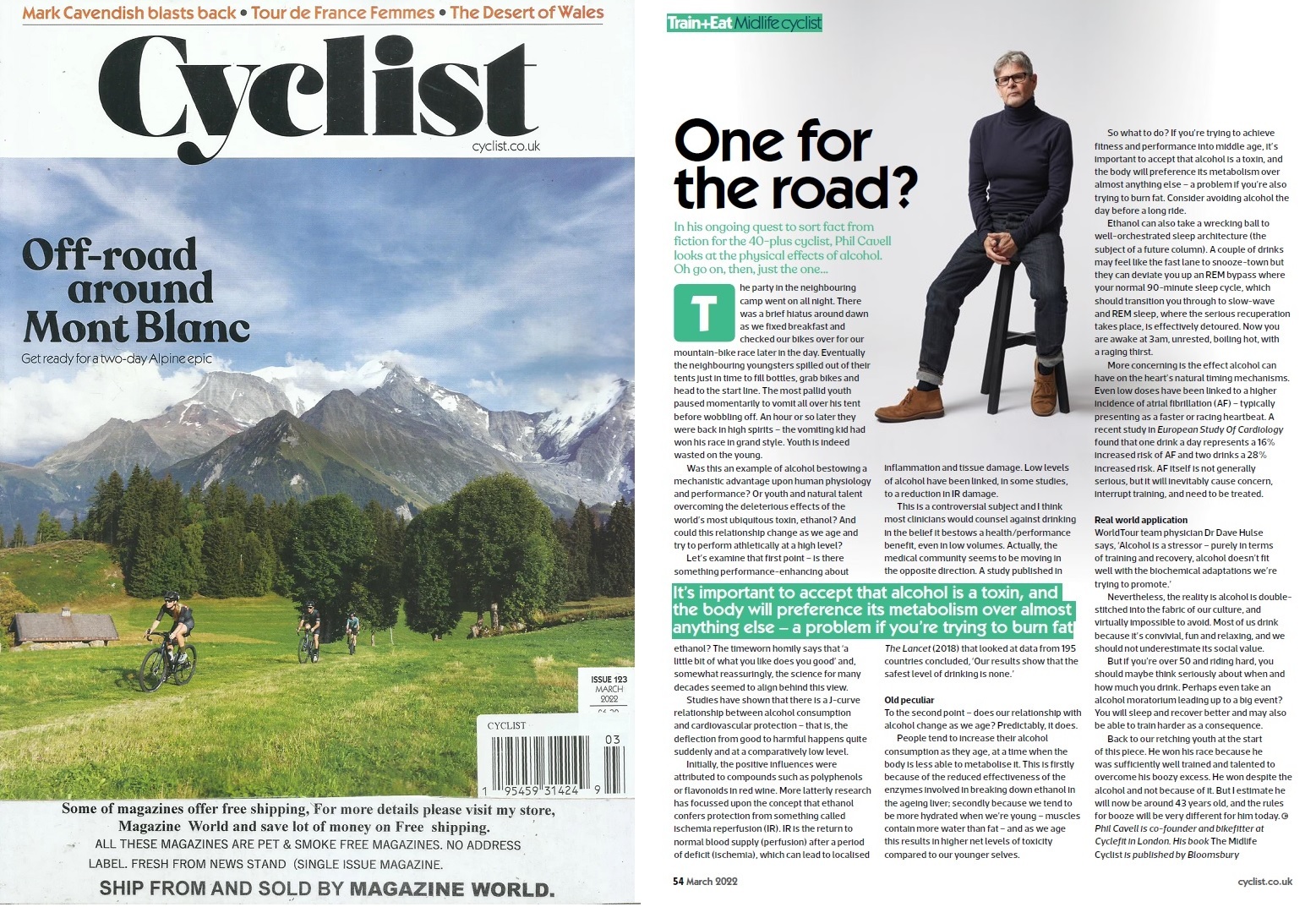One For The Road?
The party in the neighbouring camp went on all night. There was a brief hiatus around dawn as we fixed breakfast and checked our bikes over for our National Points Series mountain-bike race later in the day. The neighbouring youngsters spilled out of their tents just in time to fill bottles, grab bikes and head to the start line. The most pallid youth paused momentarily to vomit all over his tent, before wobbling off. An hour or so later they were back in high spirits – the vomiting kid had won his race in grand style. Youth is indeed wasted on the young.
Powered by Beer?
Was this an example of alcohol bestowing a mechanistic advantage upon human physiology and performance? Or youth and natural talent overcoming the deleterious effects of the world’s most ubiquitous toxin, ethanol? And could this relationship change as we age and simultaneously try to perform athletically at the highest level?
"Our results show that the safest level of drinking is none"
To the first point -
Is there something intrinsically health or performance enhancing about ethanol?
The time-worn homily says that:
‘a little bit of what you like does you good’.
Somewhat reassuringly, the science for many decades seemed to align behind this prevailing view. Studies had seemed to show a J-Curve relationship between alcohol consumption and cardiovascular protection – i.e. the deflection from good to harm happens quite suddenly and at a comparatively low level. Initially, the positive influences were attributed to compounds such as polyphenols or flavonoids in red-wine. More latterly research has focussed upon the concept that ethanol confers protection from something called Ischemia Reperfusion, or IR. IR is the return to normal blood supply (perfusion) after a period of deficit (ischemia), which in turn can lead to localised inflammation and tissue damage. Low levels of alcohol have been linked, in some studies, to a reduction in IR damage. This is a controversial subject and I think most clinicians would strenuously counsel against starting drinking, in the belief it bestows a health/performance benefit, even in low volumes. Actually, the medical community seems to be moving in the opposite direction - a study published in The Lancet (2018) that looked at data from 195 countries concluded:
“Our results show that the safest level of drinking is none”
"Alcohol is a toxin, and the body will preference its metabolism over almost anything else"
To the second point -
Does our relationship with alcohol change as we age? Well, predictably, it does. Most preceding generations seem to increase their alcohol consumption as they age (in my family at least), at a time when the body is probably less able to metabolise it. Firstly because of the reduced effectiveness of the enzymes involved in breaking down ethanol in the ageing liver. And secondly, because we tend to be more hydrated when we are young – muscles contain more water than fat, which results in higher net levels of toxicity compared to our younger selves.
Mixed Picture?
So how do we interpret this mixed picture?
I recommend adopting an alcohol strategy if you are also trying to achieve fitness and performance into middle-age and beyond. Accept that alcohol is a toxin, and the body will preference its metabolism over almost anything else – a problem if we are also trying to burn fat. So maybe consider avoiding alcohol the day before a long endurance training ride or event?
"Now you are awake at 3:00am, entirely unrested, boiling hot, with a raging thirst."
REM Rebound
Ethanol can also take a wrecking ball to well-orchestrated sleep architecture (the subject of a future column). A couple of drinks may feel like it puts you into the fast lane to Snooze-Town but can deviate you up an REM Bypass. Now your normal 90 minute sleep cycle, that should transition you through to slow-wave and REM (rapid eye movement) sleep, where the serious recuperation takes place, is effectively detoured. Now you are awake at 3:00am, entirely unrested, boiling hot, with a raging thirst.
More concerning than a couple of unforeseen middle-of-the-night paracetamols, is the effect alcohol can have on the heart’s natural timing mechanisms. Even low doses of alcohol have been linked to a higher incidence of atrial fibrillation (AF) – typically presenting as a faster or racing heart-beat. A recent study in European Study of Cardiology found that one drink a day represents a 16% increased risk of AF and two drinks a 28% increased risk, compared to avoiding alcohol altogether. AF itself is not generally serious, but it will inevitably cause concern, interrupt training, and need to be treated.
Whoop’s collated data has shown that alcohol also negatively affects HRV or Heart Rate Variability (the deviation between beats) - HRV is strongly implicated in your body’s rest and recovery state. World Tour Team Physician, Dr Dave Hulse on the role of alcohol on performance and health:
“Alcohol is a stressor - purely in terms of training and recovery, alcohol doesn’t fit well with the biochemical adaptations we’re trying to promote.”
A cornerstone of of our culture
Nevertheless, the reality is ethanol consumption is double-stitched into the fabric of our culture, and therefore virtually impossible to avoid. Most of us drink because it is social, fun and, in the moment at least, extremely relaxing, and we should not underestimate its social value.
But, if you are post-50 and riding hard or training for an event, you should maybe think seriously about when and how much you drink. Maybe even take an alcohol moratorium leading up to your big event? You will sleep and recover better and may also be able to train harder as a consequence.
"Alcohol is a stressor - purely in terms of training and recovery, alcohol doesn’t fit well with the biochemical adaptations we’re trying to promote."
Whatever became of the vomiting youth?
Back to our sea-sick youth at the start of the piece. He won his race because he was sufficiently well trained and talented to overcome the headwinds that excess alcohol blew in his face. He won despite the alcohol and not because of it. But he will now be around forty-three years old and his own rules of engagement with ethanol will inevitably be well and truly on the turn.
Phil Cavell is co-founder at Cyclefit in London. His book The Midlife Cyclist is published on Bloomsbury
This Column was first published in Cyclist Magazine - March 2022 and is re-printed here with their kind permission.


